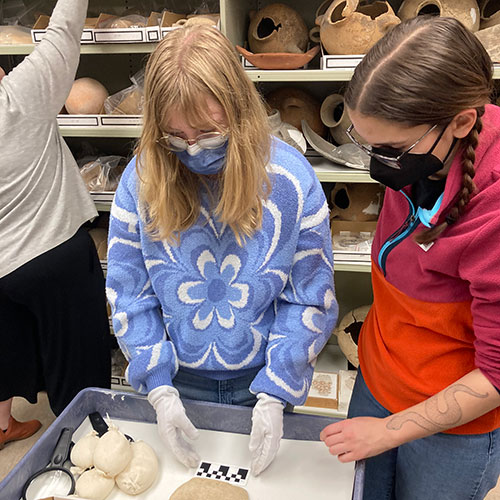
Pella @ Wooster ushers ancient artifacts collection into 21st Century

A group of faculty and students at The College of Wooster is bringing new life and visibility to a collection of ancient artifacts that had been tucked safely into storage on campus for nearly 30 years.
An archaeological dig that started in 1967 and uncovered the objects and fragments at Pella—one of the most notable archaeological sites in Jordan—was an important chapter of Wooster’s experiential learning history; however, its presence or significance was as dusty as the antiquities.
“These objects have been lost to the scholarly community and the enthusiast community,” said Beth Derderian, assistant professor of anthropology and museum studies. She is also one of the faculty members involved with creating public accessibility to the richness of the collection.
The Pella @ Wooster Project was started to remedy the collection’s hidden identity and bring it into the limelight on a website where everyone can have access to a catalogue of the information. Leading the project with Derderian are Marianne Wardle, director and curator of The College of Wooster Art Museum; Siavash Samei, visiting assistant professor of archaeology and anthropology, and Middle Eastern & North African studies; and Olivia Navarro-Farr, associate professor of archaeology and sociology & anthropology.
The timing of the project aligned with promotion of the College’s Museum Studies Program, and Museum & Archival Studies Pathway, and the introduction of the museum studies minor last fall. Increased interest worldwide in repatriation and the growing awareness of systemic issues inherent in museum collections became a catalyst for exploring the use of the legacy collection within the curriculum.
The team decided the initial process for the project required careful documentation of everything that was excavated and logged by the student team led by Robert Houston Smith first in 1967, Wooster’s then professor of religious studies. They collected whole objects and fragments, and they documented everything with photographs, documents, and index cards with descriptions. Internal correspondence, including memos, is also part of the collection.
Derderian and Samei wanted to help students understand the concept of radical transparency, or the ability to be completely open with the public about what is included in the collection and how the items were obtained and cared for. With Wardle’s expertise in antiquities, they have been working “to build opportunities for students to get involved in doing real museum work and to deal with the kinds of dilemmas that museum practitioners face, not as abstract questions, but very real questions,” Derderian said.
In late fall 2022, Pella @ Wooster officially kicked off and engaged student research assistants, a special collections assistant, and an art museum assistant. They are involved in the detailed, but necessary work of data entry, to get an index of the documentary evidence that is included in the collection. They are taking all of the information from the cards and transcribing it into an Excel spreadsheet. Wardle explained that the spreadsheet will eventually be dropped into a database format that will be searchable and legible on a website. Derderian expects the catalogue to be ready possibly as early as next spring, depending on how the work progresses into next fall and spring. In the meantime, students are also leading the effort to create more awareness by posting information on the project’s own media accounts. The social media presence will be ongoing on TikTok @pellawoo and Instagram @pellawooster.
The students are doing work that is common for museum professionals. “We are being really clear and open with our students about the ethics of historical excavation, the system of partage that historically Western countries and others have participated in, and the ethics and care of keeping material, and what best practices might be now,” Wardle said. “We don’t know if anyone in Jordan wants the Pella material back, but it’s really important for us to have the conversations about that. What is our responsibility to them? And what duties do we need to put on ourselves to maintain and share them, and be willing to let them go, if that is what’s best.”
“We have different views now, and we should be having those conversations with the up-and-coming future generation of museum professionals, archeologists, and anthropologists about the ethics of our field and how they change over time. It’s important that our practices take that into account,” Wardle added.
Image: Students, Emily Voneman ’25 and Maura Ellenberger ’25 review items in the collection from Pella.
Posted in News on April 3, 2023.
Related Posts
Related Areas of Study
Museum Studies
The Museum Studies minor requires six courses, with one required course and the remaining to be selected from experiential and theory courses. Alongside MUST […]
MinorSociology
The study of social life, social change, and the social causes and consequences of human behavior.
Major MinorMuseum & Archival Studies
Explore the diverse traditions of collection, curation, research, display, and preservation and plan your career
PathwayArchaeology
Fieldwork and research are a big part of the study of prehistoric and historical archaeology
Major MinorAnthropology
Use problem-solving and research skills to explore and understand communities and cultures in every part of the world.
Major Minor

